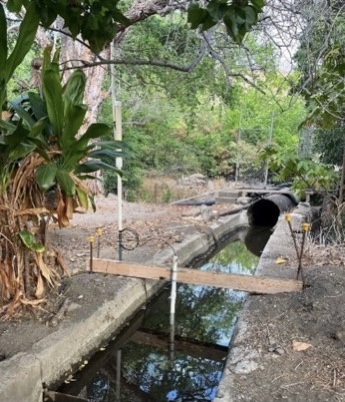On November 15, the Water Commission approved a settlement with Olowalu Water Company, LLC of a violation case commission staff brought in October.
Staff had initially recommended that the commission find that the company had violated the interim instream flow standards for Olowalu Stream, set by the commission in March 2018, for 553 days between January 1, 2019 and October 7 of this year. They recommended fines totaling $470,000.
At the company’s request, the commission deferred voting on the matter for one month to see what improvements could be quickly made to the water diversion system to avoid future violations. Even though they chose to defer, commissioners made it clear they felt a large fine was justified.
After the October meeting, OWC bought two data loggers, one to monitor how much water is being diverted and the other to measure what’s left in the stream. Data from the loggers are to be shared with commission staff. The company also repaired leaks and cracks in its diversion system and submitted required water use reports.
The company still has not modified its intake to keep low flows in the stream and to meet the IIFS. Although a design had been approved years ago, the company is developing a new one. Once OWC receives design approval from the U.S. Army Corps of Engineers and the commission, the work should be completed within a year.
At the November meeting, staff recommended approval of the settlement that had been worked out over the past month. In lieu of the fine, OWC would provide the Olowalu Cultural Reserve, which receives water via a pipe in the stream, with a sand filter to reduce blockages and leaks. The estimated cost is $15,000-$20,000.
For four years and no more than once a month, OWC would also assist the cultural center with chipping invasive vegetation cleared around the stream. The value of that work was estimated to be $168,000.
Finally, the settlement called for OWC to drain its lower reservoir, remove any silt and debris, and reline it within three years to increase storage capacity and system efficiency. That work was estimated to cost $300,000.
Altogether, the value of the work required under the settlement exceeded the proposed fine amount.
“There was no intent to violate the law. We apologize,” OWC’s Glenn Tremble told the commission.
Several members of the public testified both for and against the settlement. Some appreciated that the settlement work ensures that the money will be spent improving the Olowalu area. Others thought the company was getting off easy and preferred the imposition of fines given its history of violations in Olowalu and actions of related companies with regard to other streams in West Maui.
As a compromise, commissioner Neil Hannahs made a motion to approve the fine as originally proposed and allow OWC to get credit for the work included in the proposed settlement. However, Hannahs said that because OWC stands to benefit from the reservoir improvements, it should only receive a 50 percent credit for that work.
Commissioner Mike Buck seconded the motion.
Cal Chipchase, an attorney representing OWC, said he didn’t think they could agree to that approach. “The settlement was to avoid a contested case,” he said, adding that the company does not agree with the commission staff’s fine calculation.
“With respect, we would accept the proposed settlement as drafted,” he said.
“I just offer back, one of your objectives is to gain the trust of the community. They think you’re paying for things that benefit you. On the reservoir, it does benefit you and your customers … Not that they’ll get any more water, but they’ll get it more reliably,” Hannahs replied.
Earlier in the meeting, Chipchase had announced that in addition to the work called for in the settlement, OWC planned to line another of its reservoirs. Given that, commissioners decided to fold that work into the settlement. So rather than giving OWC full credit for improving one reservoir, the commission would give it a 50 percent credit for two.
Hannahs’ amended motion to reflect that change was unanimously approved.
—Teresa Dawson


Leave a Reply